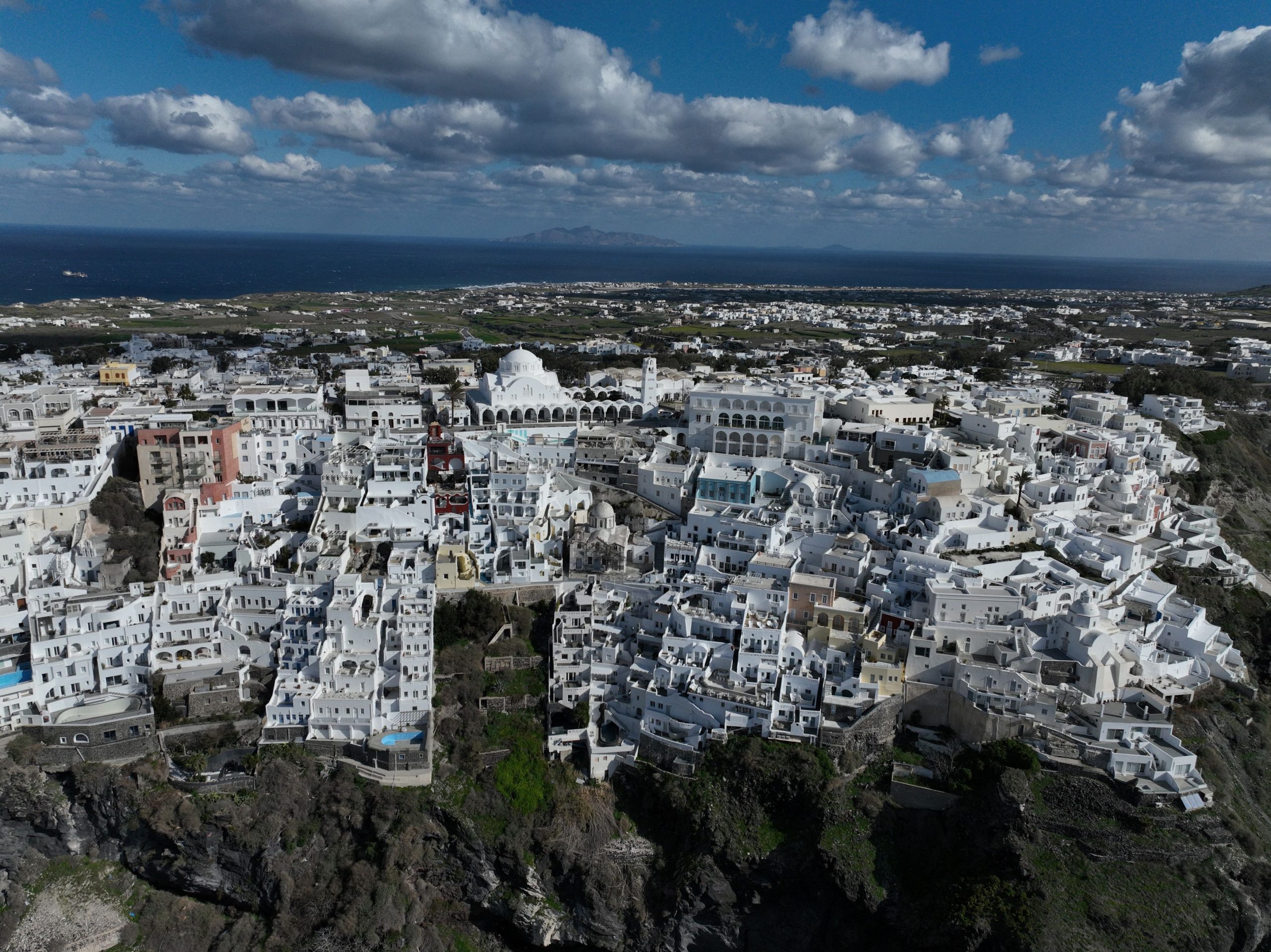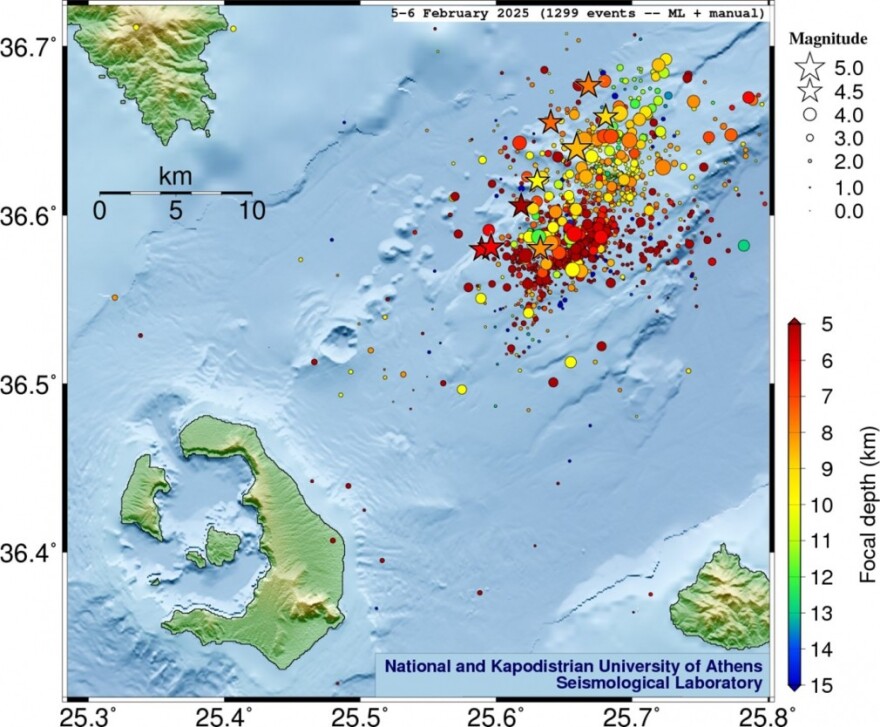
Earthquakes continue to shake the Cyclades.
Between 00:52 and 10:16 Greek Time (EET) on February 8, a series of at least 51 earthquakes shook the Aegean Sea, according to data from the Geodynamic Institute of the National Observatory of Athens. The tremors, ranging in magnitude from 1.9 to 4.4, were concentrated south-southwest of Arkesini, Amorgos, near Anafi, and northeast of Santorini.
The most powerful earthquake in this sequence struck at 03:52 EET, measuring magnitude 4.4 at a depth of 10 km, centered 17 km south-southwest of Arkesini, Amorgos. This was followed by two additional magnitude 4.1 tremors at 05:08 and 05:11 EET, both occurring 26 km south-southwest of Arkesini.
Several more moderate earthquakes also punctuated the sequence. A magnitude 3.8 event occurred at 00:20 EET, with a depth of 22.8 km, making it the deepest recorded quake of the swarm. Other notable tremors included a magnitude 3.2 at 23:52 EET, a magnitude 3.1 at 23:09 EET, and multiple magnitude 3.0 events recorded shortly after midnight.
The majority of the earthquakes were clustered around Arkesini, Amorgos, where depths ranged between 7 km and 15 km, with a few deeper tremors exceeding 15 km. The Anafi region also experienced several smaller earthquakes, primarily in the magnitude 2.0 to 3.3 range. Northeast of Santorini, three earthquakes were recorded, the strongest reaching magnitude 2.7 at a depth of 9 km.
Out of the 51 recorded quakes, three were above magnitude 4.0, 20 ranged from magnitude 3.0 to 3.9, and 26 fell in the magnitude 2.0 to 2.9 range.
The National & Kapodistrian University of Athens on Friday announced that more than 8,900 earthquakes were recorded in the Santorini-Amorgos axis in the southern Aegean since Jan. 26.
However, the overall seismic activity in the area appears to be gradually decreasing, based on data from both conventional methods and artificial intelligence analysis, according to a statement from the Interdisciplinary Committee for Risk and Crisis Management at the National University of Athens.

On Saturday , Greece’s seismic and volcanic risk committees are set to meet to review the latest data and make recommendations to the authorities. Scientists are also expected to advise on whether schools should remain open.
Source: Tovima.com
Latest News

Easter Week in Greece: Holy Friday in Orthodoxy Today
At the Vespers service on Friday evening the image of Christ is removed from the Cross and wrapped in a white cloth

Meloni and Trump Meet in Washington, Vow to Strengthen Western Ties
“I am 100% sure there will be no problems reaching a deal on tariffs with the EU—none whatsoever,” Trump stressed.

ECB Cuts Interest Rates by 25 Basis Points in Expected Move
The ECB’s Governing Council opted to lower the deposit facility rate—the benchmark for signaling monetary policy direction—citing an updated assessment of inflation prospects, the dynamics of underlying inflation, and the strength of monetary policy transmission.

Current Account Deficit Fell by €573.2ml Feb. 2025: BoG
The improvement of Greece’s current account was mainly attributed to a more robust balance of goods and, to a lesser extent, an improved primary income account

Hellenic Food Authority Issues Food Safety Tips for Easter
Food safety tips on how to make sure your lamb has been properly inspected and your eggs stay fresh.

Greek Kiwifruit Exports Smash 200,000-Ton Mark, Setting New Record
According to data by the Association of Greek Fruit, Vegetable and Juice Exporters, Incofruit Hellas, between September 1, 2024, and April 17, 2025, kiwifruit exports increased by 14.2%.

Easter Tourism Boom: Greece Sees 18.3% Surge in Hotel Bookings
Among foreign markets, Israel has emerged as the biggest growth driver, with hotel bookings more than doubling—up 178.5% year-on-year.

Greece to Launch Fast-Track Tender for Offshore Hydrocarbon Exploration
Last week, Papastavrou signed the acceptance of interest for the two Cretan blocks, while similar decisions regarding the two Ionian Sea blocks were signed by his predecessor

American-Hellenic Chamber of Commerce to Open Washington D.C. Branch
AmCham's new office aims aims to deepen U.S.-Greece economic ties and promote investment and innovation between the two countries

Why Greece’s New Maritime Spatial Plan Is a Geopolitical Game-Changer
This landmark development is more than just a bureaucratic step — it's a strategic declaration about how Greece intends to use, protect, and assert control over its seas








![Πλημμύρες: Σημειώθηκαν σε επίπεδα ρεκόρ στην Ευρώπη το 2024 [γράφημα]](https://www.ot.gr/wp-content/uploads/2025/04/FLOOD_HUNGRY-90x90.jpg)




![Airbnb: Πτωτικά κινήθηκε η ζήτηση τον Μάρτιο – Τι δείχνουν τα στοιχεία [γράφημα]](https://www.ot.gr/wp-content/uploads/2024/07/airbnb-gba8e58468_1280-1-90x90.jpg)












![ΙΟΒΕ: Πώς το δημογραφικό υπονομεύει την ανάπτυξη – Τι συμβαίνει στις ελληνικές περιφέρειες [γραφήματα]](https://www.ot.gr/wp-content/uploads/2025/04/dimografiko-600x375.jpg)











![Airbnb: Πτωτικά κινήθηκε η ζήτηση τον Μάρτιο – Τι δείχνουν τα στοιχεία [γράφημα]](https://www.ot.gr/wp-content/uploads/2024/07/airbnb-gba8e58468_1280-1-600x500.jpg)


 Αριθμός Πιστοποίησης
Αριθμός Πιστοποίησης